I used Facebook and Twitter to try and promote my last blog post as well as solicit opinions for my next blog post. It is clear to me after all my attempts, despite the fact that this was already painfully obvious anyway, that the most effective way to get people to respond to questions is to already have a big following.
Question Blog Post Promotion
Below is what I tweeted a couple of weeks ago to promote my question blog post.

Being as I only have 29 followers, I’m not certain how helpful this tweet was in gaining responses. Seeing as the only people who commented on my post were in this class, I’m going to guess that I probably didn’t get anyone to respond to my post because of Twitter.
On Facebook, to promote my post, I tried to use more specific questions to drive people to comment on my post. My tweet didn’t really contain any questions for people to ponder over as they debated clicking on my blog post link, so I thought perhaps it would help to try and get everyone thinking about the topic before they read the post.
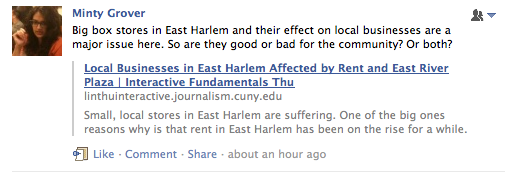
In this situation, I realize that most people only click on links that interest them as Facebook tends to be over-saturated with links already. Despite the fact that I have many more Facebook friends than Twitter followers, it would probably be better next time to target the ones who are actually interested in the topic I’m asking questions about, rather than just posting it on my wall and hoping for the best.
Survey Blog Post Research
The topic I’m doing for my survey blog post is the effect youth unemployment has had on the issue of “Stop and Frisk” and arrests in East Harlem. I chose a topic that I felt would get different opinions because it seemed like this would make a good survey. To solicit responses, I posted a public Facebook note with a few statistics and quotes to try and get people thinking about the issue before they answered the questions.
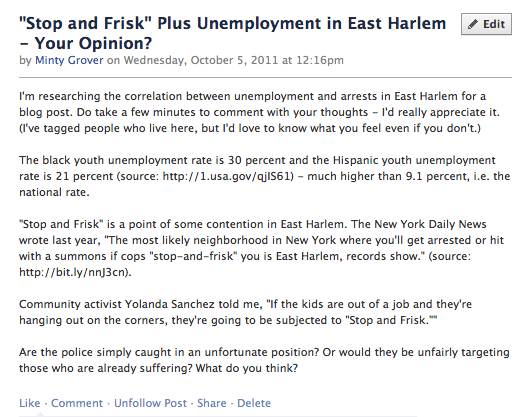
Below are the responses.
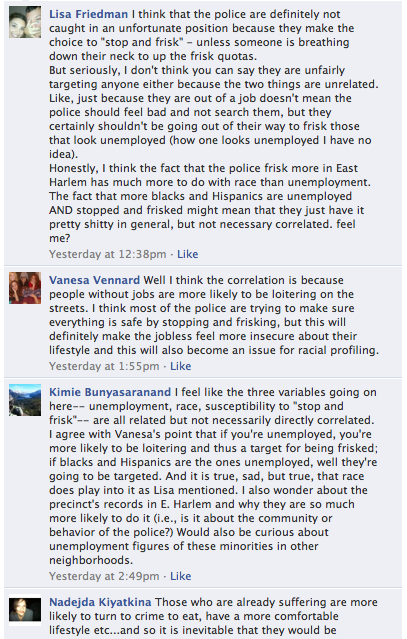

This worked a lot better in gaining responses, despite the fact that there were only four. I was also pleased that the comments were clearly very thoughtful and had got at least few people thinking about the topic. I also tagged people I knew who lived in East Harlem in this note, to try and target it to people who might be interested in the topic for personal reasons.
Additionally, I promoted this note in two groups on Facebook (here and here) as well as on Twitter. I also tweeted the question with a hashtag to see if people using that hashtag might respond. Below are the two tweets and one of the Facebook group promotion posts (the other one didn’t get any responses).


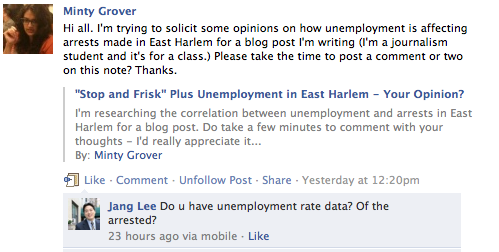
Again, on Twitter, I probably didn’t get anyone to read the note and comment for the same reasons as with my previous Twitter promotion campaign that I detailed above. The Facebook group I promoted my note on, however, is the group for people in my building which is in East Harlem (it’s the CUNY GC Housing building). It’s a group of 57, so I wasn’t really expecting many responses, and I was surprised to get a comment, frankly. Not that the one comment the post got was eloquently waxing on about the issue exactly, however he did have an interesting question to ask about the unemployment rate data of the arrested, which is something I can look into for my survey blog post.
Conclusion
Despite the fact that I was mostly rejected in all my various attempts to get people to respond to me on Facebook and Twitter, I did learn from it. Other than targeting the questions appropriately and using hashtags effectively, I honestly believe the one biggest factor that helps the situation is to have a large following. It seems to me that this is probably one of the most important things to work on, by constantly posting insightful and thought-provoking things on these various forms of media.


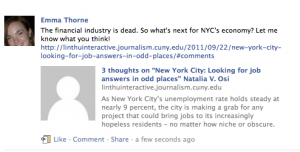 …and I got exactly one comment, which can’t be reprinted here. (It was a joke from a friend of mine.) Looking at the posts as they’re laid out here, I wonder if the issue was partially visual. I don’t know how to insert a thumbnail pic into a link posted on Facebook, but I clearly need to figure that out, because the posts look kind of hideous and unappealing without images. I don’t know that I’d click on them, either!
…and I got exactly one comment, which can’t be reprinted here. (It was a joke from a friend of mine.) Looking at the posts as they’re laid out here, I wonder if the issue was partially visual. I don’t know how to insert a thumbnail pic into a link posted on Facebook, but I clearly need to figure that out, because the posts look kind of hideous and unappealing without images. I don’t know that I’d click on them, either!
 So after this assignment, here’s what I know about social media promotion: Just putting the post up – no matter how many times you do it – isn’t gonna get you automatic audience engagement. Like so many of my classmates have commented, much to learn…
So after this assignment, here’s what I know about social media promotion: Just putting the post up – no matter how many times you do it – isn’t gonna get you automatic audience engagement. Like so many of my classmates have commented, much to learn…










